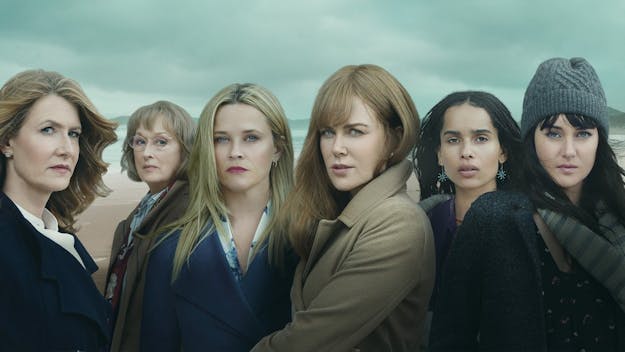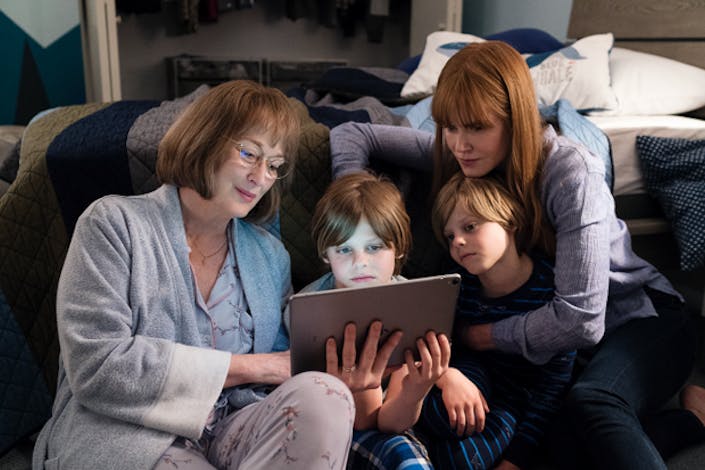Returning over two years since the premiere of its first season, HBO’s “Big Little Lies” continued on its own without any source material for season two and delivered a set of episodes that not only felt necessary for the sake of the characters but generated a truly intriguing, worthwhile plot.
Set shortly after the accidental killing of Perry Wright (Alexander Skarsgård) when Jane Chapman recognized him to be the monster who raped her and Perry nearly beat his wife Celeste (Nicole Kidman) to death, the “Monterey Five” face demons both old and new in addition to the constant threat that their lie will be uncovered.

Bonnie Carlson (Zoë Kravitz), a character who was used more strongly this season than last, deals with the guilt of fatally pushing Perry down a flight of stairs in defense of her friends in addition to the health problems of her mother, who we learn was abusive to her as a child. Bonnie’s character this season was a total wreck, which for us as the audience was a rollercoaster viewing experience. Bonnie was never made out to be the helpless damsel in distress, but rather someone dealing with the trauma from a history of abuse and the horrors of coming to reality with regret and dissatisfaction with her life. Kravitz allowed us to feel Bonnie’s pain, yet also gave her unstable character a sense of mystery and unpredictability, creating an engaging duality.
Madeline Mackenzie (Reese Witherspoon) struggles with her marriage to Ed (Adam Scott) after cheating on him last season; the selfish and combative suburbanite can create a sense of empathy for us just as she did previously, a testament to Witherspoon as an actress. She knocked the house down last season and continues to express Madeline’s weaknesses and brings layers to her character that few actors are capable of. Despite being snotty regularly, Madeline is a character who we may not want to get into an argument with, but we can recognize her personal struggles and therefore connect with her as a character.
Celeste (Nicole Kidman) recovers from the horrific physical and emotional abuse she received from Perry but soon has her mother-in-law Mary-Louise (Meryl Streep) to deal with. Recognizing that Celeste is suffering from rage, grief, Ambien usage, sexual promiscuity and drinking, Mary-Louise tries to get Celeste’s two sons in her custody, fearing for their safety. Kidman’s performance is the epitome of a strong female character, one who faces real-life challenges and whose struggles don’t feel forced. Kidman excels in portraying Celeste’s emotional dichotomy in regards to her love for her late husband and the fury and passion instilled in her motherly ways.
However, Streep is the one who steals the show this season. Her introduction as Mary-Louise is a brilliant addition, and having her serve as an antagonist of sorts brings the story together beautifully. Streep is someone I have always found to be a bit overrated, despite being widely regarded as the world’s greatest actress, but her performance this season has greatly changed my overall view of her. Mary-Louise is a character you ferociously hate one minute but end up empathizing with due to how her backstory is strategically used to bring layers to the character. We recognize that she isn’t someone who hates Celeste and wants revenge after her son’s death, despite learning of his violent ways, but is truly concerned for her grandchildren and wants a purpose and a sense of belonging in her depressing life.

Jane Chapman (Shailene Woodley) is hounded by Mary-Louise after learning that Perry raped her and is the father of Jane’s son Ziggy. Woodley captures the struggle of handling the truth of who Ziggy’s father is and explaining this to him beautifully. Strangely, the conflict that erupts with Mary-Louise seems to bring Jane closer to her son, which provides a heartwarming relief throughout the season. We also find Jane struggle to trust men and come to terms with her love for a new co-worker at the Monterey Bay Aquarium, which was a touching gesture throughout the show because we were able to see Jane humanized after her scared existence from last season.
Lastly, the arrogant, rude and controlling Renata Klein (Laura Dern) has her wealthy world turned upside down when her husband Gordan gets in trouble for illegal financial actions and causes them to file for bankruptcy. Dern gives the best performance in the show for her consistent skills in expressing pure anger and frustration, her character a ticking time bomb who unleashes her fury without any trace of difficulty. While Renata isn’t easy to empathize with at all, Dern brings an infectious distaste to the character that you love to hate, her behavior a cringe-worthy demonstration of utter madness and greed. She’s impossible to take your eyes off of due to her unpredictability and wild anger.
“Big Little Lies” had the difficult task this time around of proving to audiences that it had a clear direction building off of season one. The showrunners had to create fresh new conflicts that weren’t predictable and to make the story grounded by the characters' struggles. What struck me most about this season is how it was able to remain in fashion from its predecessor, yet hold an original identity to itself and create a new story that left us hungry for more after every episode.
The show’s beautiful location of Monterey and Carmel, California could steer the show into being a typical suburban drama about unsatisfied women, yet what makes the story so enriching is how it uses wealth as a shield for these women. It expresses how the deeply human struggles surrounding marriage, trust, loss, trauma, grief and fear are universal issues regardless of economic status.
So many things could have gone wrong and felt like sappy, melodramatic garbage, but “Big Little Lies” constantly shields itself from any clichés or failures and remains consistently invested in its fierce, vulnerable female characters that are not only relatable but genuinely interesting. “Big Little Lies” excelled yet again in tackling so many important topics through these women, yet was able to avoid crumbling in its ambition like so many other shows and films do when focusing on so many different themes and conflicts at once.
The show used its dramatic potential to its utmost ability with its excellent writing and delivered a tremendous outcome full of delicious drama and magnificent performances. We’re trusted to understand and connect to these characters after being away from them for so long, and not for one second did it seem like we didn’t recognize them or connect with their conflicts.
Ending on a poignant bittersweet note (which I will admit was a bit underwhelming considering the stakes the plot was elevated to), it's pretty clear the show ended after its final scene. Season one ended where it could be open to more or end where they left it, and thankfully it continued and gave us a brilliant season of rich drama and personal conflicts. “Big Little Lies” ended its second season in a way that resolved the show satisfyingly and echoed its ideas intelligently while ending the journeys of the “Monterey Five.”
I will admit I was worried the show would be a wreck this season, yet “Big Little Lies” proved it had more to say about its characters and delivered a well-constructed second half to an unforgettable series.
Final Grade: A
Dominic LeRose is a staff writer for the Daily Cardinal. To read more of his work, click here.






